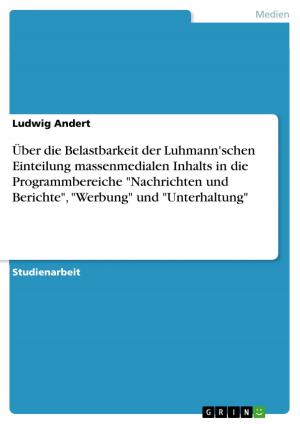| Author: | Judith Plante, Karl Nordhill | ISBN: | 9783638155762 |
| Publisher: | GRIN Publishing | Publication: | November 23, 2002 |
| Imprint: | GRIN Publishing | Language: | English |
| Author: | Judith Plante, Karl Nordhill |
| ISBN: | 9783638155762 |
| Publisher: | GRIN Publishing |
| Publication: | November 23, 2002 |
| Imprint: | GRIN Publishing |
| Language: | English |
Seminar paper from the year 2002 in the subject Business economics - Marketing, Corporate Communication, CRM, Market Research, Social Media, grade: Passed with Distinction (1,0), Växjö University (School of Management and Economics), course: International Marketing Strategies, 20 entries in the bibliography, language: English, abstract: Any company that starts to do business in foreign markets goes through a process, which is triggered by proactive and/or reactive factors. This process starts generally by finding and selecting a target market, decisions which frequently are made on the basis of marketing research. An important part of the research is to locate the market entry barriers, when entering in the foreign market. With this information the company has to develop a strategy to enter the market. Within the strategy formulation the company also has to choose an appropriate mode of entry. There are several different market entry modes and no one is the correct one, since they all have advantages as well as disadvantages. They are, however, more or less suitable depending on the company, its resources, its products etc. (Czinkota, 1993, p. 329-331, Johansson, 1997, p. 208 ff, Taylor, C. 2000). However, a company's internationalization process does not stop here. As the company gains experience from its current activities, it may want to make additional investments in the market, due to factors that could be described as internal or external. These factors could also motivate a change of entry mode. Extreme views even say that once the internationalization process has started, it will tend to proceed regardless of whether strategic decisions are made in that direction or not (Randoy, T. 2002, Wheeler, 1996). Although a lot of theory has been written on internationalization and on the choice of entry mode, there is little to be found on the internationalization process and particularly on the changing of entry mode. To realize that the company could find itself in such a situation, where they need to develop in the foreign market, can be difficult. The fact that the strategy and in that also the entry mode chosen needs to be changed can be hard for a company to grasp, because change is always connected with a high degree of uncertanity. Research has shown (Randoy, T. 2002, Wheeler, 1996) that companies have found themselves in situations where their strategies and entry modes needed to be changed and, more importantly, research (Randoy, T. 2002, Wheeler, 1996) has shown that companies has managed to change entry modes. However, what the research lack is more indepth analysis of the process of changing entry mode. For reasons indicated above, a company in the relevant situation may need some help, some recommendations, which could make the change process less uncertain. [...]
Seminar paper from the year 2002 in the subject Business economics - Marketing, Corporate Communication, CRM, Market Research, Social Media, grade: Passed with Distinction (1,0), Växjö University (School of Management and Economics), course: International Marketing Strategies, 20 entries in the bibliography, language: English, abstract: Any company that starts to do business in foreign markets goes through a process, which is triggered by proactive and/or reactive factors. This process starts generally by finding and selecting a target market, decisions which frequently are made on the basis of marketing research. An important part of the research is to locate the market entry barriers, when entering in the foreign market. With this information the company has to develop a strategy to enter the market. Within the strategy formulation the company also has to choose an appropriate mode of entry. There are several different market entry modes and no one is the correct one, since they all have advantages as well as disadvantages. They are, however, more or less suitable depending on the company, its resources, its products etc. (Czinkota, 1993, p. 329-331, Johansson, 1997, p. 208 ff, Taylor, C. 2000). However, a company's internationalization process does not stop here. As the company gains experience from its current activities, it may want to make additional investments in the market, due to factors that could be described as internal or external. These factors could also motivate a change of entry mode. Extreme views even say that once the internationalization process has started, it will tend to proceed regardless of whether strategic decisions are made in that direction or not (Randoy, T. 2002, Wheeler, 1996). Although a lot of theory has been written on internationalization and on the choice of entry mode, there is little to be found on the internationalization process and particularly on the changing of entry mode. To realize that the company could find itself in such a situation, where they need to develop in the foreign market, can be difficult. The fact that the strategy and in that also the entry mode chosen needs to be changed can be hard for a company to grasp, because change is always connected with a high degree of uncertanity. Research has shown (Randoy, T. 2002, Wheeler, 1996) that companies have found themselves in situations where their strategies and entry modes needed to be changed and, more importantly, research (Randoy, T. 2002, Wheeler, 1996) has shown that companies has managed to change entry modes. However, what the research lack is more indepth analysis of the process of changing entry mode. For reasons indicated above, a company in the relevant situation may need some help, some recommendations, which could make the change process less uncertain. [...]















